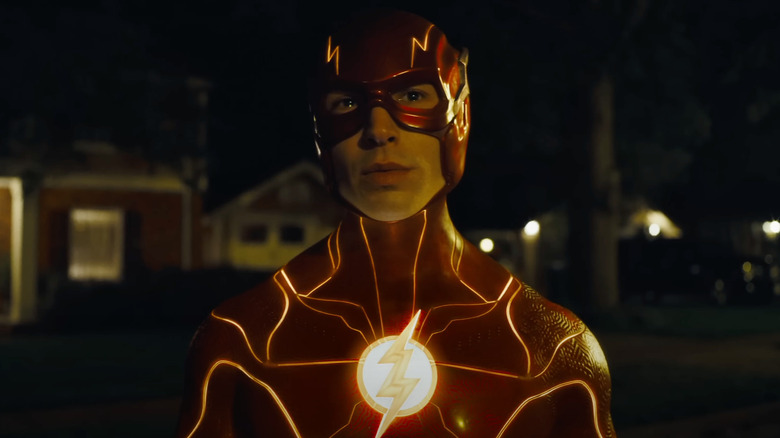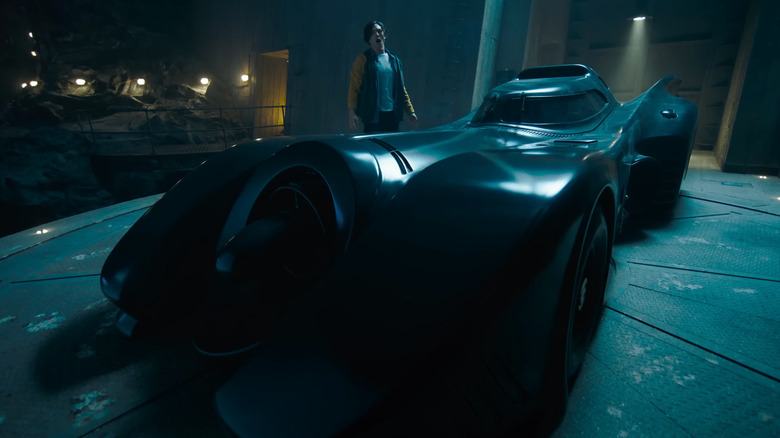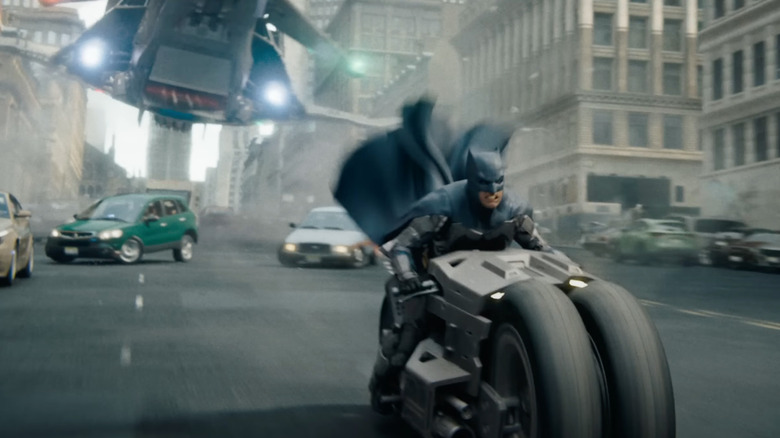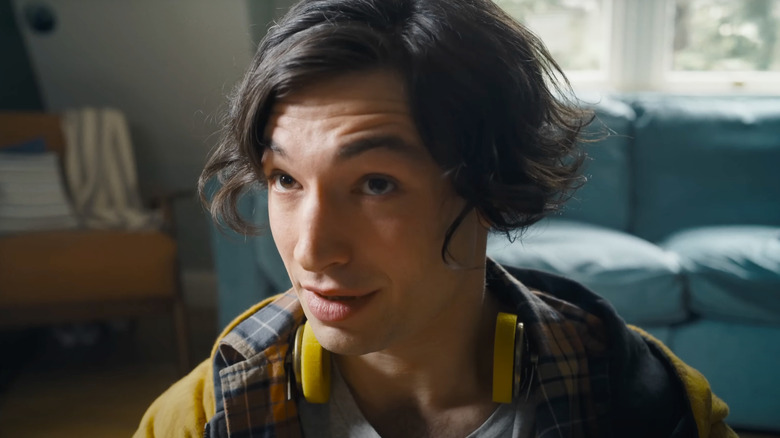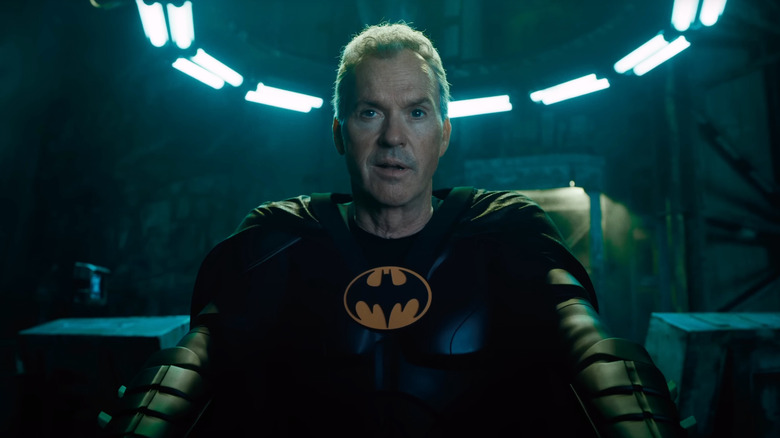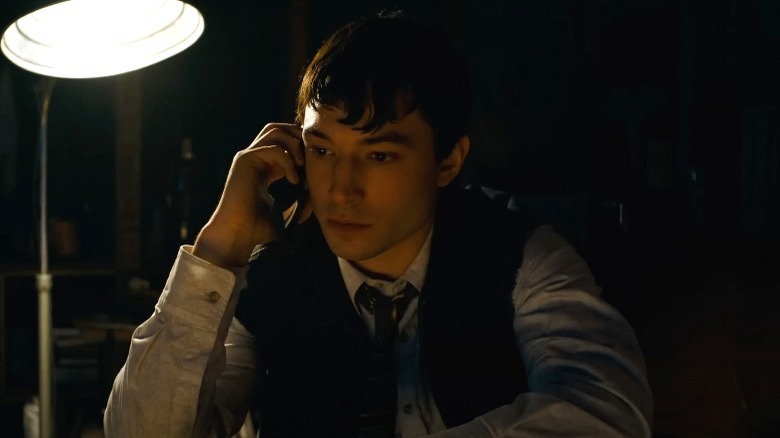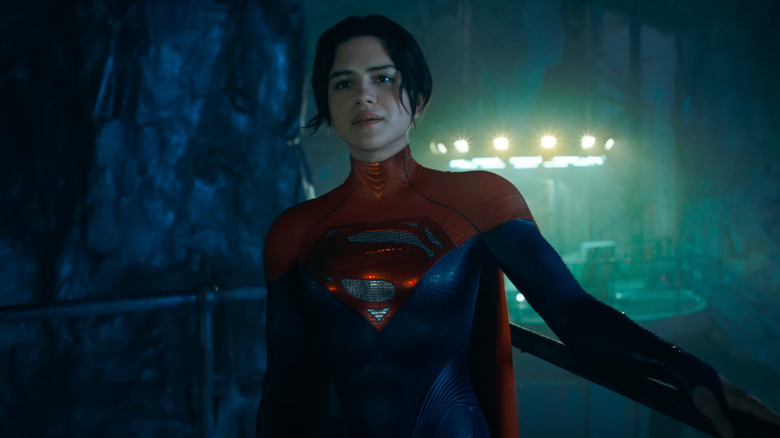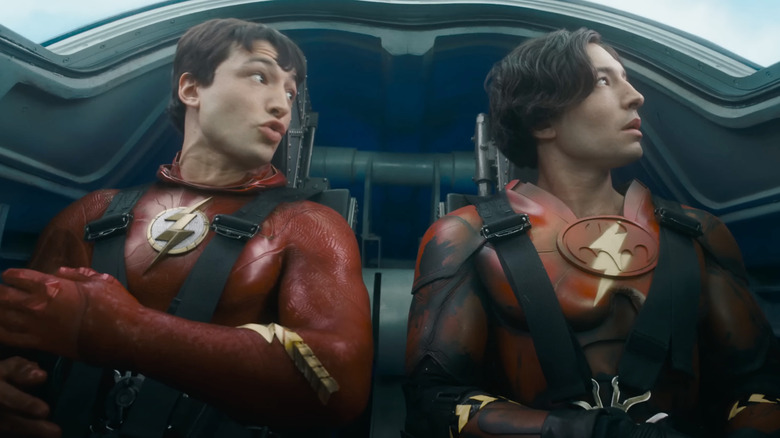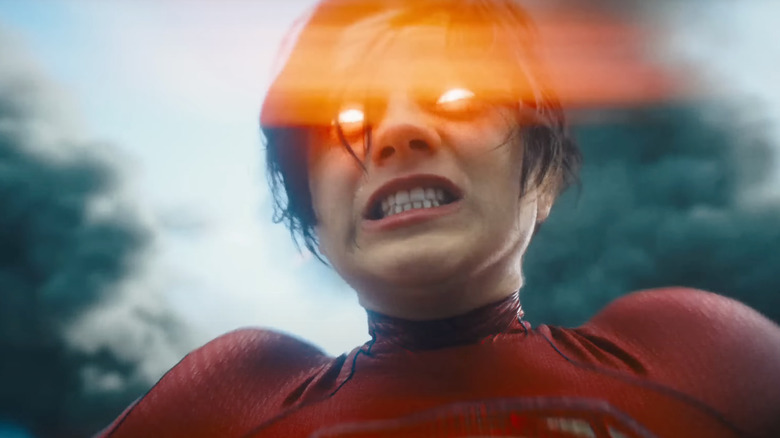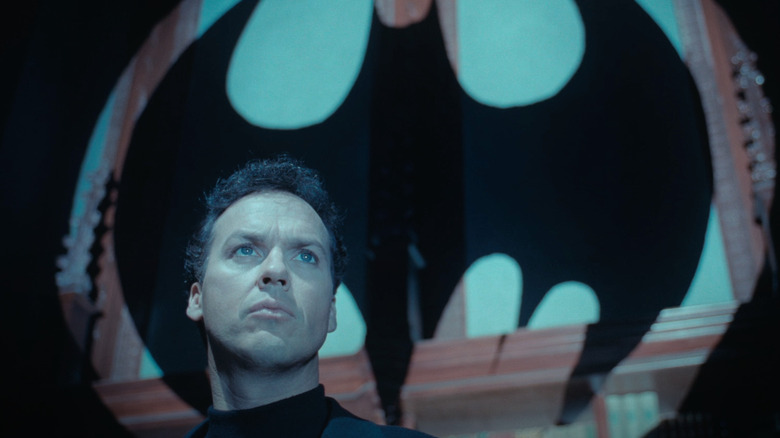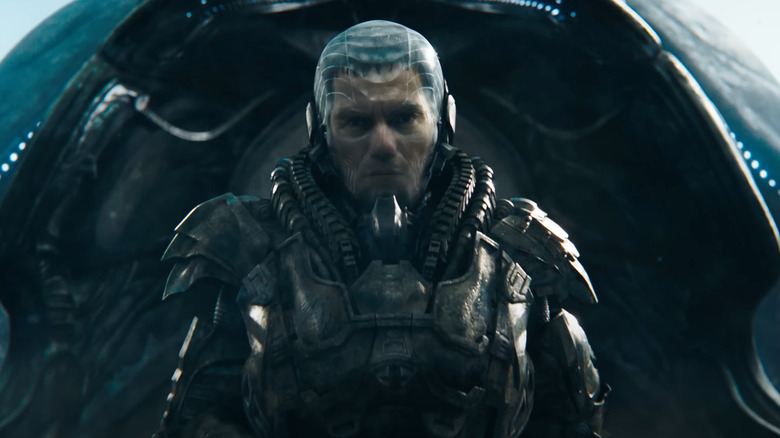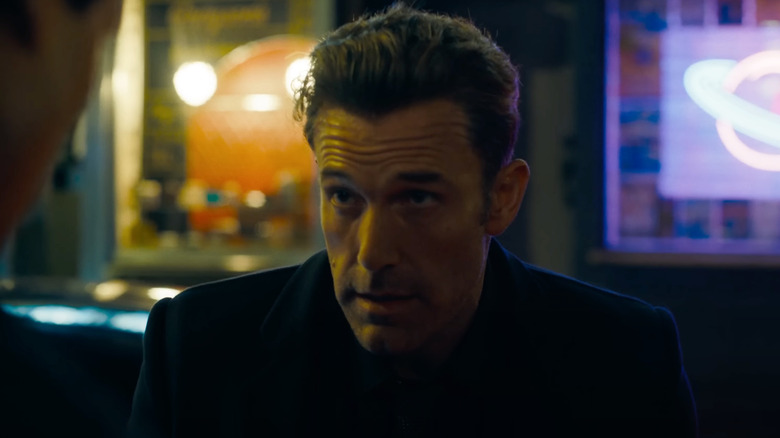Moments In The Flash That Make Absolutely No Sense
The following post contains spoilers for "The Flash."
Finally, Andy Muschietti's long-awaited "The Flash" arrives in theaters, bringing with it a mix of spectacle and flaws. While it delivers plenty of excitement, the film has an inconsistent storyline, uneven performances, excessive CGI, and an overabundance of half-baked ideas. It contains plenty of enjoyable moments, particularly those involving Michael Keaton's returning Batman, but lacks a cohesive tone and, unfortunately, attempts to mimic Marvel's successful formula, rather than forging its own, unique path forward.
For those unfamiliar, "The Flash" centers around Barry Allen (the controversial Ezra Miller), a speedster who attempts to change the past to save his mother. However, his actions disrupt history, risking the stability of the world. Joining forces with his younger self, Barry enlists the help of Batman (Keaton) and the enigmatic Supergirl (Sasha Calle) to restore the timeline and avert disaster.
Despite a cast that includes Ben Affleck, Gal Gadot, Kiersey Clemons, Michael Shannon, Maribel Verdú, and Ron Livingston, "The Flash" contains numerous moments that defy logic and leave viewers perplexed. Here are just a few.
The Batmobile
As explained, "The Flash" intermittently entertains. Director Andy Muschietti clearly loves these characters, but he had to incorporate so many elements into the film that the result is an empty, bloated mess that relies on blink-and-you'll-miss-'em appeals to fan nostalgia. Most egregiously, the film includes Michael Keaton's Batmobile from "Batman" and "Batman Returns" in a highly-publicized appearance, only for it to do ... well, absolutely nothing.
We first see Keaton's Batmobile when the two Barrys visit the Batcave and discover the vehicle concealed underneath a protective sheet. Muschietti provides a lavish reveal for the massive car, and even allows young Barry to take a nap in its driver's seat. Unfortunately, the Batmobile never leaves the Bat Cave, instead yielding to a reworked (and admittedly cool) Batwing for the grand climax. As someone who owned the Batmobile toy as a kid, including that bulky plastic "shield," I found its lack of screen time incredibly vexing. Why introduce such a cool prop if you're not going to at least rev up the engine?
Considering the various updates to the Batwing and Batcave, it makes little sense that the Batmobile looks exactly like it did 30 years ago. At some point, Batman should've traded in his car for a new model, but that would've prevented this clunky bit of fan service from occurring.
Batfleck's costume
The opening sequence of "The Flash" offers a fun glimpse at the Justice League — well, most of them — in action. Barry races to a hospital to rescue a dozen babies from certain death, while Ben Affleck's Batman pursues a group of goons on his "Dark Knight"-inspired Batpod. Overall, this scene provides enjoyable thrills and showcases Batman's vast arsenal of gadgets. However, when the chase transitions to a confrontation on a bridge with Wonder Woman (Gal Gadot), everything takes a turn for the worse.
In broad daylight, where everyone can see him, Batman greets Diana with a goofy smile that recalls 2017's disastrous "Justice League" while wearing the worst-designed Batsuit in movie history. Bruce's absurd attire looks like it's made out of plastic and is overloaded with components. Moreover, the suit doesn't seem to fit Affleck, sagging in all the wrong places. It's evident that the costume designers wanted to cater to Zack Snyder fans while also appeasing those who wanted a lighter version of the hero, but failed to satisfy both groups. Batman is a billionaire superhero whose entire deal is hyper-competence; there's no way he'd settle for this. Considering that "The Flash" likely marks Batfleck's final appearance, this last hurrah is very disappointing.
Young Barry Allen
Okay, this might seem like nitpicking, but during the first hour of "The Flash," I found myself questioning young Barry Allen's neurotic personality. The concept of two Barrys working together to solve their time travel dilemma in an homage to Robert Zemeckis' "Back to the Future" trilogy didn't bother me. However, I couldn't help but wonder why young Barry was so unhinged, particularly considering that he exists in a timeline where both of his parents are alive and well. One would expect this version of Barry to behave more responsibly. Instead, he acts like an 8-year-old on a never-ending sugar high, throwing temper tantrums, screaming all of his dialogue, and creating more problems than solutions.
At a certain point, I wondered if young Barry's peculiar behavior would play a role in the plot. Would the Flash realize that having both his mother and father around prevented his less-experienced counterpart from maturing? Unfortunately, the elder Barry shows no surprise at his younger self's antics, suggesting that his life remains largely unchanged whether his mother lives or dies. Given the numerous complexities associated with time travel, one would expect a more nuanced approach to this subject. But hey, why strive for logic when the film can instead rely on an endless barrage of eye-rolling gags targeted at younger viewers?
Michael Keaton's Batman
The big draw of "The Flash" (at least for me) was Michael Keaton's return as Batman, reprising his role from "Batman" and "Batman Returns." However, while Keaton does appear in "The Flash" and takes part in a few impressive fight sequences, his part in the story feels arbitrary and rushed. Other than fan service, there's no reason for him to be here. Initially, Keaton's Bruce appears as a grizzled, slightly unstable old man. Soon, though, we learn that Gotham City has become a crime-free utopia, rendering Batman unnecessary. Bruce decides to don the cape and cowl once more when Barry asks for his help, but the transformation occurs far too quickly, leaving the impression that some material was left on the cutting room floor.
"The Flash" eschews other opportunities to explore this version of Bruce Wayne and how he's changed in the 30 years since his last appearance in favor of silly shenanigans, like a spaghetti fight at Wayne Manor. Just as frustratingly, the fate of Vicki Vale, Catwoman, Alfred, and the rest of the characters that populated Tim Burton's Gotham City remain unknown. Keaton's presence feels like a superficial nostalgia play at best, and a cheap marketing ploy at worst. His Batman doesn't have the substance needed to justify his inclusion, and his underwhelming death scene lacks the necessary gravitas.
Barry saves his dad
The ending of "The Flash" left me scratching my head. Early on, we learn that even a small change to history, like moving a can of tomatoes, has ripples across the multiverse. The timeline is so fragile that Barry must go back in time to prevent his past self from saving his mother. However, at the end of the film, we see two puzzling events: First, Barry has a heartfelt conversation with his mom, and then he moves an entire shelf of tomatoes to strengthen his dad's alibi. Surprisingly, the only consequence of these actions is that George Clooney now plays Bruce Wayne.
Wait, what?
Since Batman's origins predate the death of Barry's mother, why did this small act impact Bruce? Perhaps Barry slipped into an alternate dimension — but wouldn't that mean that yet another version of Barry exists? And why is Batman the only character affected by Barry's actions? In the end, I left the theater feeling indifferent about Barry's choice to save his father, and more concerned about the implications of George Clooney's appearance in the DC Extended Universe.
Furthermore, it seems like Henry Allen (Ron Livingston) had incredibly incompetent lawyers. Wouldn't there be eyewitnesses or other evidence to support his alibi? Couldn't he provide a receipt, or show that his car was in use during the time of his wife's murder? Ah, but who cares — George Clooney is here!
Supergirl's defeat
One of the highlights of "The Flash" is Sasha Calle's Supergirl, a dark and intense take on Kara Zor-El. The character fits right in with the vibes Zack Snyder established for this shared universe, and leaves a lasting impression despite her limited screen time. However, she meets her demise much too quickly.
In "Man of Steel," Superman easily overpowers Zod and his minions. Even after Zod reaches the peak of his powers, Superman defeats him in combat and ultimately takes his life. In "The Flash," Supergirl confronts Zod during his arrival on Earth, before he's had a chance to adapt to Earth's yellow sun. However, despite her immense strength, Supergirl struggles to defeat him. In fact, as Barry discovers, there are no scenarios in which Supergirl or Batman save the planet from Zod.
Is Supergirl significantly weaker than Superman? How does Zod's weapon manage to pierce her invulnerable skin? Why is Kara's heat vision ineffective against him? The film doesn't provide any answers to these — or other — questions, leaving us more confused than captivated. Additionally, it's not clear why Supergirl and Batman don't fly to Metropolis to disable the World Engine, a move that would've thwarted Zod's plans and better integrated Batman into the film's final act.
Dark Flash
I'm still grappling with Dark Flash. Supposedly, he's a future version of young Barry who went too deep into the time travel vortex to save Supergirl and Batman. To eliminate Dark Flash, young Barry sacrifices himself, causing the villain to vanish. But if young Barry saw his future self and realized his mistake, wouldn't that immediately erase Dark Flash?
The rules of time travel are confusing, and while I understand the need for some suspension of disbelief, "The Flash" seems to make things up without careful consideration for the consequences. The third act is messy, disjointed, and laden with subpar CGI — despite Muschietti's explanation for the latter, it reeks of reshoots. Here's my theory: Originally, the young boy Barry saves during Zod's attack became Dark Flash, seeking vengeance for his father's death by killing Nora and spiraling into madness thanks to his desire to fix his tragic past. Maybe he wanted to kill Henry instead, but was forced to murder Nora since she was the only one in the house when he arrived.
As it stands, however, Dark Flash's emergence lacks impact and is burdened by logical fallacies and an unsatisfying resolution. It ends the film on a flat note.
Supergirl leaves, then returns
There's another odd moment in "The Flash" involving Supergirl. After escaping the Russian facility, she becomes disillusioned with humanity and flies away. Conveniently, however, she chances upon Zod's army just as they launch their attack on Earth. Zod notices her, and the scene cuts back to the two Barrys and Batman as they attempt to restore old Barry's powers.
Surprisingly, Supergirl returns, deciding that Zod must be stopped. She lifts Barry into the sky to be struck by lightning, bypassing Batman's peculiar bat-shaped kite. The plan succeeds, Barry's powers return, and everyone gears up for battle, slowly flying back towards Zod's army. Meanwhile, the U.S. military somehow manages to hold their own against these advanced beings, despite teetering on the brink of defeat.
The major issue is the lack of urgency our heroes display. While Barry's desire to regain his powers is understandable, the entire team noticeably lacks the motivation to take immediate action. Additionally, neither Supergirl leaving the military nor Zod spotting her and not pursuing her make sense. A better scenario would have been Supergirl fighting, getting overpowered, and returning beaten and exhausted, only for Zod to arrive at Wayne Manor and launch his final assault. As it stands, the final act is too clumsy and chaotic.
Tim Burton-verse
During "The Flash," I couldn't stop wondering whether or not Tim Burton's Gotham City exists in this universe. We see elements from Burton's films, such as his Wayne Manor, various gadgets and suits from "Batman" and "Batman Returns," and Joker's laughing bag. At the same time, Metropolis resembles the one in "Man of Steel," and Barry's neighborhood is entirely ordinary.
So, is this the world where Burton's films take place, or is it an entirely different universe that happens to include another version of Keaton's Batman? If the latter, then why does Danny Elfman's iconic score accompany Keaton's arrival? And why all the references to "Batman" and "Batman Returns"? It doesn't quite add up, and feels like the writers inserted Keaton's character into the story after deciding not to include Jeffrey Dean Morgan as the "Flashpoint" Batman, who would have been a more fitting choice considering the film's location, aesthetic, and plot. If Warner Bros. wanted Keaton's Batman instead, why not have Zod emerge in a world that blends Burton and Snyder's styles? That would have been more intriguing.
Why does Zod attack Metropolis?
"The Flash" makes extensive references to Zack Snyder's "Man of Steel," even recreating moments from the film, like Zod's attack on Earth. However, "The Flash" often fails to provide context for these scenes, and includes moments that defy previously established logic. In "Man of Steel," Zod recognizes Metropolis' significance to Kal-El and specifically targets the city to hurt him. This leads to the film's divisive finale.
In "The Flash," Zod's World Engine hovers over Metropolis and causes chaos, but the film fails to provide a clear explanation for why he chose that location. Considering that Zod was guided to Earth by Supergirl's beacon, it would've made more sense for him to focus on her location. Logically, the climax of "The Flash" should have taken place in Russia, not America.
Further, the film doesn't address how the codex ended up in Supergirl, or whether Jor-El intentionally used his son as a distraction. Zod explains that he killed the infant Kal-El while trying to extract the codex from his body, only to discover it was in Kara all along. The lack of answers to these questions and the glossing over of finer details is perplexing, rendering "The Flash" more confusing than satisfying.
The future of the DCEU
As mentioned earlier, in the closing moments of "The Flash," George Clooney returns as Batman, while Jason Momoa makes a post-credits appearance as Aquaman. However, the future of the DC Extended Universe (DCEU) is uncertain, particularly with James Gunn promising a full-on reboot of Warner Bros. DC properties.
If there is another "Flash" movie in this continuity, will Clooney reprise his role as Batman? Will Gal Gadot continue as Wonder Woman? Will Nic Cage end up playing Superman? "The Flash" could have served as a satisfying conclusion to the Snyderverse, but it feels like more of a reset, leaving room for potential sequels. Setting up stories that we're probably not going to see is an odd and confusing choice, given that Warner Bros. knows that Gunn and Peter Safran's new take is just a few years away.
Overall, "The Flash" is a perplexing mess, throwing various ideas at the wall in hopes of finding one that sticks. It's an enjoyable and visually vibrant film, but ends up caught between the past and future, running in place without a clear direction.
